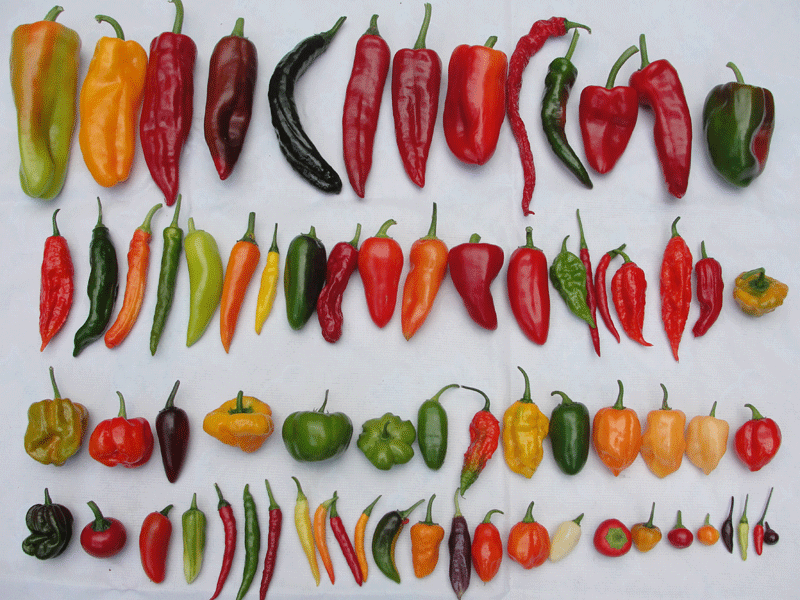
Topic Alert
Receive an email from Medscape whenever new articles on this topic are available.
Drug & Reference Information
Eating foods that contain even a small amount of nicotine, such as peppers, may reduce the risk for Parkinson's disease (PD), new research hints.
Peppers are in the same botanical family as tobacco — the Solanaceae family. In a population-based study, researchers found that increasing consumption of edible forms of Solanaceae plants was associated with a lower risk of developing PD, with peppers displaying the strongest association.
"If our results are confirmed in similar studies, and we also learn more about why peppers might be protective, then the research may be of particular interest to people who want to eat foods that might benefit their health, especially people without PD already," Susan Searles Nielsen, PhD, who led the study, told Medscape Medical News.
"We weren't able to explore whether peppers or other foods slow progression of the disease once you have it, although research to address that question might be a natural extension," added Dr. Searles Nielsen, research scientist in the Department of Environmental and Occupational Health Sciences, University of Washington, Seattle.
The study was published online May 9 in Annals of Neurology
Consistent Inverse Association With Tobacco
Research has consistently shown an inverse association between PD and tobacco use, with people who have ever regularly smoked cigarettes less likely to develop PD than others. Some animal studies indicate that nicotine might help protect neurons. "However, it's unclear whether nicotine or something else in tobacco is actually protective, or whether people predisposed to PD simply don't respond well to tobacco smoke and therefore avoid it," Dr. Searles Nielsen explained.
Dr. Susan Searles Nielsen |
"A few studies suggest that secondhand smoke might be associated with a reduced risk of PD, so that prompted us to look at another source of a relatively small amount of nicotine — foods in the same plant family as tobacco," she added.
The researchers assessed whether nicotine from edible Solanaceae influences risk for PD in 490 adults with newly diagnosed PD and 644 unrelated, neurologically healthy controls. They used questionnaires to assess participants' lifetime diets and tobacco use.
They report that PD was inversely associated with consumption of all edible Solanaceae combined (relative risk [RR], 0.81; 95% confidence interval [CI], 0.65 - 1.01), but not consumption of all other vegetables combined (RR, 1.00; 95% CI, 0.92 - 1.10).
They found that the trend "strengthened" when they weighted edible Solanaceae by nicotine concentration (P for trend = .004).
An inverse association was also evident for peppers specifically (P for trend = .005). Eating peppers 2 to 4 times per week was "consistently" associated with a 30% reduction in risk for PD (RR, 0.70; 95% CI, 0.50 to 1.00), the researchers report.
The potentially protective effect of peppers was mainly in people who had little or no prior tobacco use, which is "intriguing," Dr. Searles Nielsen said. "That is where you would expect to see the clearest association if something in both tobacco and peppers, such as nicotine, is protective."
"This lends strength to our findings, along with our observations that the association grew stronger with greater consumption of peppers and that there was no association between PD and eating vegetables outside this plant family. However, more research is needed to fully understand whether eating peppers might help prevent PD," Dr. Searles Nielsen said.
Novel Approach, New Evidence
The observation that smokers have a lower risk for PD has been "consistently reported in more than 60 epidemiological studies," Honglei Chen, MD, PhD, from the National Institute of Environmental Health Sciences, Research Triangle Park, North Carolina, who wasn't involved in the study, told Medscape Medical News.

"All previous studies on this topic have focused on analysis of smoking behaviors, while this study took a very different and novel approach by examining nicotine from diet in relation to Parkinson risk. Although this study did not settle the controversies regarding smoking and PD, it offers new evidence that supports a causal explanation," Dr. Chen said.
He cautioned, however, that this is a "preliminary finding that needs to be replicated, particularly from prospective studies that assess dietary habit before PD diagnosis.
"This study, however, is an excellent example of a novel approach for studying the relationship between smoking and PD. Further, if this finding could be confirmed, it adds to the health benefits of eating tomatoes and green peppers," Dr. Chen said.
The study was sponsored in part by the University of Washington Superfund Research Program and the National Institute of Environmental Health Sciences. The authors and Dr. Chen have disclosed no relevant financial relationships.
Ann Neurol. Published online May 9, 2013. Abstract


